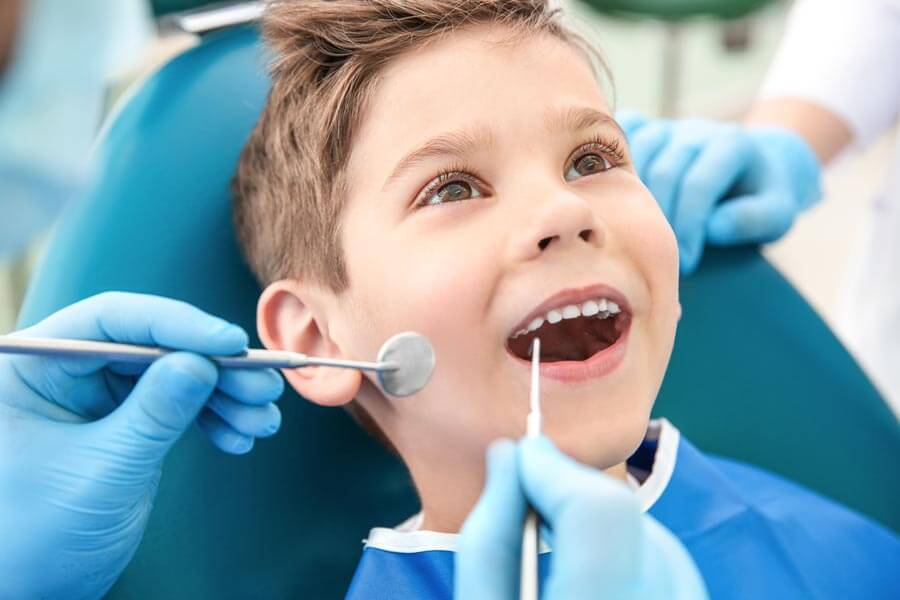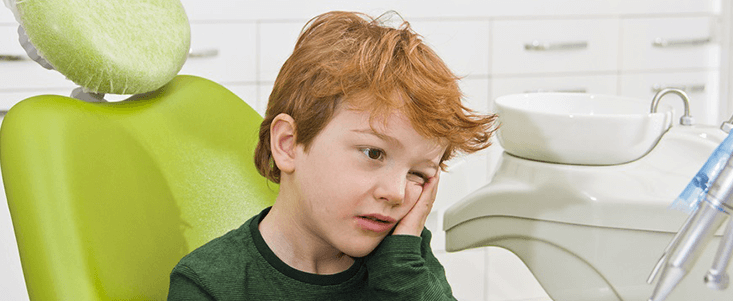
Calling all Superheroes
It’s Children’s Dental Health Month. Be a dental super hero and protect your smile! Call us today or schedule your appointment online.

It’s Children’s Dental Health Month. Be a dental super hero and protect your smile! Call us today or schedule your appointment online.

Dentistry for Kids: What the Tooth Fairy Won’t Tell You
POSTED ON JANUARY 13TH, 2018
Kids are constantly growing and changing, and their mouths are no exception! Throughout childhood, kids lose their baby teeth, gain adult teeth, and they begin to take ownership of their own oral health. From brushing to braces to practicing their smile, oral health is important for every kid at every stage.
We know you love to see your child smile! Summit Family Dental Care does too. Read our tips to learn how to help keep your kid smiling for life.
Caring for Kids’ Teeth
Your child’s first teeth – often called “baby teeth” – make their momentous early arrival and continue to serve many purposes until they fall out and are replaced by adult teeth. Baby teeth hold a place in the jaw, paving the way for the adult teeth to grow in properly. Kids who develop cavities are more likely to develop them later as adults. Don’t dismiss the importance of oral health for kids, even though there’s so much transition in their mouth in these early days.
Basic oral health for kids includes brushing and flossing twice a day. Be sure your child is brushing long enough (and having some fun) by playing a favorite song that’s roughly two minutes long to brush along to. Very young children may still need help and supervision to be sure they’ve thoroughly brushed all their teeth. But don’t wait to teach your kid how to do this on her own—kids are more likely to participate if they feel empowered and valued in the process.
For kids 3 and up, fluoride toothpaste is safe and recommended for the best tooth care and prevention.
Kids need good nutrition for growing, healthy bodies—teeth and gums included! Serve meals with lots of vitamins and minerals, and make sugary snacks and drinks a rare treat to prevent cavities and tooth decay.
And of course, take your child to see the dentist twice a year for checkups and professional cleanings.
Care for Every Occasion
Your kid’s oral healthcare should be just as personalized as all of their interests and activities. Depending on your family’s lifestyle, here are some special ways to celebrate and protect your kid’s teeth:
Consider fun “Tooth Fairy” traditions to celebrate your child’s growth as they lose their baby teeth and gain the adult set.
It’s very important that kids wear mouth guards while playing sports. Losing a tooth (baby or adult) causes a lot of other problems in the mouth, and mouth guards can also help prevent concussions!
If your kid does lose a tooth (playing sports or otherwise), keep it clean and wet in water or milk and call your dentist immediately. Use the emergency answering service if it’s after normal business hours.
Older kids and teens start to become aware of their appearance and bad breath. These are extra reasons to encourage healthy habits (like brushing, flossing, and wearing a retainer) to build confidence.
Dentists Love Kids!
Children should visit the dentist twice a year, just like adults. After cleaning your child’s teeth, your dentist may suggest:
Sealants, a strong “sealing” material over the chewing surface of teeth to prevent cavities. (Sealants are cheaper than getting a cavity filled, too.)
Depending on age, mouth size, and state of the wisdom teeth, your dentist might suggest scheduling a minor extraction procedure to have them removed.
Braces, spacers, or other orthodontics might be necessary to help your child’s mouth grow in the healthiest shape.
Drs. Gburek, Barone, Moore, & Hetrick in Geneseo & Warsaw provide professional dental care for kids of all ages. Make an appointment for your child today to invest in millions of smiles to come.
Sources
http://www.mouthhealthy.org/en/babies-and-kids/
http://www.colgate.com/en/us/oc/oral-health/life-stages/childrens-oral-care

When you’re suddenly struck with a toothache, floating ideas of home remedies may quickly come to mind. Whether you heard it from your great-aunt or saw it on Pinterest, at-home treatments are everywhere. Warsaw and Geneseo dentists, Dr. Gburek, Dr. Barone, Dr. Moore, Dr. Hetrick, and Dr. Scofield can explain more about how to care for a toothache and when to come in for a visit.
Common causes of toothaches are infections, cavities, damaged enamel, a cracked tooth or an exposed root – all good reasons to get yourself to the dentist! Home remedies for a toothache may work for immediate relief, but they’re not likely to last long, and they may not be completely safe.
If you like using household ingredients for personal care, you may look into your own pantry for something to relieve the pain, but do your research prior to use–and before things get too out of hand, contact your dentist to prevent worse pain or problems.
What Are Common Home Remedies for a Toothache?
The best-case scenario is some pain relief with a simple ingredient or treatment. Be cautious as even relatively harmless ingredients might irritate other parts of your gums and tongue. The most commonly shared tips for treating a sore tooth at home are:
Alcohol: Either in the form of whiskey or vanilla extract, alcohol can clean and kill bacteria that cause pain. It can also numb the irritated tissue. Alcohol is commonly applied directly to the sore tooth or via a soaked cotton ball left on the spot.
Garlic: Can kill germs that cause pain and inflammation. Usually applied by chewing a raw head of garlic or mashing it up and applying to the spot in pain.
Saltwater: Saltwater can rinse away pain-causing junk on your teeth and gums and can ease inflammation of tissue. Swish and gargle water with pure salt a couple times per day and be sure to spit it out when you’re done.
Herbs: Peppermint, spearmint, cinnamon, and cloves are popular disinfectants that may also numb the area in pain for a short while. Do not apply herbs in essential oil form directly to your mouth because they are too strong and will only hurt you more. Try swishing a small amount in your mouth with water, or put a damp tea bag right onto the affected area.
If Something Is Really Wrong
As with many natural remedies, most of these would probably be best used preventatively. By the time you truly have a toothache, there is likely a deeper problem that needs to be fixed. Pain is your body’s way of telling you that something is wrong. To be relieved of pain and prevent further damage, treat the cause, not the symptom. Blood, swelling, discoloration, and persisting pain should send you to the dentist right away.
If you have a toothache, contact Dr. Gburek, Dr. Barone, Dr. Moore, Dr. Hetrick, and Dr. Scofield at Summit Family Dental Care in Warsaw and Geneseo to make an appointment and get at the root of the problem. Be ready to report when the pain started and if it aches more or less at different times of the day.
The content on this blog is not intended to be a substitute for professional medical advice, diagnosis, or treatment. Always seek the advice of qualified health providers with questions you may have regarding medical conditions.

Did you know that unhealthy gums might put your brain at risk?
Alzheimer’s is a form of dementia, which harms your memory, ability to think, and can cause changes in your personality. It’s very common and usually affects people aged 60 and over. And, Alzheimer’s might be significantly more likely to happen if your mouth and gums aren’t healthy.
The Link is Inflammation
A study at the New York University College of Dentistry found, “long-term evidence that periodontal (gum) disease may increase the risk of cognitive dysfunction associated with Alzheimer’s.”
Gum disease is a case of inflammation in your mouth. Inflammation is a natural and appropriate response in your body to fight invaders and infection. Gum disease and oral inflammation can be a minor problem or become very serious. But chronic inflammation causes a variety of health concerns that can affect everything from your oral health to your brain. Unfortunately, inflammation problems are increasingly common in the US.
The study at NYU found that gum inflammation might actually contribute to brain inflammation, which leads to neurodegeneration (the breakdown and decline in the health of brain cells and neurons) and Alzheimer’s. This was the case both for people in good health and people with existing cognitive impairment. Sometimes studies only show that two conditions are correlated, but the researchers at NYU believe gum disease is actually one of the causes of Alzheimer’s.
Alzheimer’s & Gum Disease
In the NYU study, people with Alzheimer’s had significantly more antibodies and inflammatory molecules in their blood if they had gum disease.
In addition, The Journal of Alzheimer’s Disease reported that a certain kind of oral bacteria could travel through your bloodstream and cause harm in other parts of your body, including the brain. Some oral bacteria are good and necessary. But keeping your mouth clean and healthy is the foundation for oral health and to prevent gum disease.
Signs of gum disease include:
If this is what inflamed gums look like, can you imagine if a brain was inflamed?
Prevention
If you could maintain a few simple habits that supported your oral wellness and brain health, why wouldn’t you? The benefits of daily oral hygiene are both immediate and long-term. You can make it a “mental habit.”
The most important and basic routines for oral wellness and overall health are:
If you have more questions about the oral health link to Alzheimer’s, or you want to become a part of a dental family, come see Dr. Gburek, Dr. Barone, Dr. Moore, Dr. Hetrick, and Dr. Scofield in Warsaw and Geneseo. Make an appointmentat Summit Family Dental Care today!
The content of this blog is not intended to be a substitute for professional medical advice, diagnosis, or treatment. Always seek the advice of qualified health providers with questions you may have regarding medical conditions.
Sources
« Can Dry Socket be Deadly?
Can You Treat a Toothache at Home? »

If you’re a new mom or about to be one, you’re likely already used to putting your needs second to the needs of this beautiful new little person in your life – but maintaining good oral hygiene is still important for keeping you and your baby in tiptop shape.
If something happens and you need dental work, it shouldn’t prevent you from breastfeeding regularly or from seeking the treatment you need. Dr. Gburek, Dr. Barone, Dr. Moore, Dr. Hetrick, and Dr. Scofield are experienced dentists in Geneseo and Warsaw and can explain how prioritizing your own health needs is safe and important during this stage of a woman’s life.
Dental Procedures Safe for Breastfeeding
You shouldn’t be surprised to hear that regular brushing and flossing is safe for breastfeeding mothers. In fact, it’s probably never felt more luxurious! Especially as you’re likely eating everything in sight (and perhaps indulging in sweet treats, too), it’s a good idea to keep those pearly whites as clean and healthy as possible.
We know how difficult it is to take care of yourself with a new baby – but you deserve to be healthy, and a healthy mom is a better mom. Proactive measures are protective and important as your body goes through major hormonal changes. Not to mention, what mom has time for a lengthy dental procedure? Be proactive about your dental health right now to prevent complications later.
If you are a breastfeeding mother in need of dental work, you’ll be happy to know most procedures won’t affect your milk or your baby. You will only need to pause breastfeeding for the short duration of your dental visits, and the following dental treatments are still safe while breastfeeding:
X-rays
Wisdom teeth extraction
Root canals
Fillings
Teeth whitening
Routine cleaning
Dental Drugs Safe for Breastfeeding
Your body does an excellent job of processing medicine and other substances before they get to the baby via your milk, and the old practice of pump-and-dump is rarely recommended anymore. Most effects of drugs used in dentistry should wear off as soon as your procedure is over anyway, and you can be back to nursing your bub as soon as you’re home. The following drugs common in dental work are all safe for breastfeeding mothers:
Novocain
Local anesthetic
Nitrous oxide (laughing gas)
General anesthesia
Antibiotics
More Information
Dr. Thomas Hale’s book “Medication and Mother’s Milk” is a great resource for more information on drug safety while breastfeeding. You should always share your full health history with your dentist and get your own pediatrician’s approval before receiving any dental treatment. Most dental work is totally compatible with a breastfeeding lifestyle. In fact, relaxing in the dentist chair may be the most quality alone time you get all week!
Just remember, taking care of your own dental needs is essential for the overall health of you and your baby. Contact us today to make an appointment for any regular cleanings or special dental treatment you need.
The content of this blog is not intended to be a substitute for professional medical advice, diagnosis, or treatment. Always seek the advice of qualified health providers with questions you may have regarding medical conditions.
Sources
« Can You Treat a Toothache at Home?

The dreaded words of warning for anyone who has a tooth extraction: dry socket. A dry socket is a painful complication after a routine treatment like an extraction, but it can be avoided if you’re careful, and it definitely won’t kill you. Read more below from Warsaw and Geneseo dentists, Dr. Gburek, Dr. Barone, Dr. Moore, and Dr. Hetrick, on what a dry socket is, how to avoid it, and how to treat it if it happens to you.
What is a Dry Socket?
Like any part of your body, your mouth has its own way to heal and recover itself after accidents or treatments. If you have a tooth removed, your gums will make a blood clot over the hole where the tooth was. The spot in your gums where the tooth once was is called the socket. This clot, like a scab, protects the vulnerable tissues underneath and aids healing.
If the blood clot gets removed (usually by accident), it leaves a painful and fresh wound. Where the tooth once was is now bare bone and nerves, and it hurts when they are exposed. Dry sockets increase your chance of infection and will increase your pain and prolong your healing after surgery.
Symptoms & Causes of Dry Socket
A dry socket is the most common complication following oral surgery such as tooth extraction. If you have had an extraction, the symptoms of dry socket include:
Things that put you at risk for developing a dry socket include:
Treating a Dry Socket
Dry sockets can be very painful and will prolong your healing process. Some amount of pain is to be expected after a tooth removal, but if you’re in serious pain and/or experiencing any of the symptoms of a dry socket, you should call us immediately.
The dentist can treat your dry socket by:
Pain from the dry socket will likely subside within a few days, but the dry socket will take some time to fully heal. Be sure to drink lots of water in the days following surgery to help yourself recover and eat only soft food per your dentist’s instructions. Continue to brush your teeth after tooth removal, even with a dry socket, but be very careful around the socket area.
Summit Family Dental Care is here to help with any dental needs you have. Make an appointment today if you have more questions about oral surgery, dry socket, or any issue for oral health!
The content on this blog is not intended to be a substitute for professional medical advice, diagnosis, or treatment. Always seek the advice of qualified health providers with questions you may have regarding medical conditions.
Sources
http://www.mouthhealthy.org/en/az-topics/d/dry-socket
http://www.mayoclinic.org/diseases-conditions/dry-socket/home/ovc-20305925